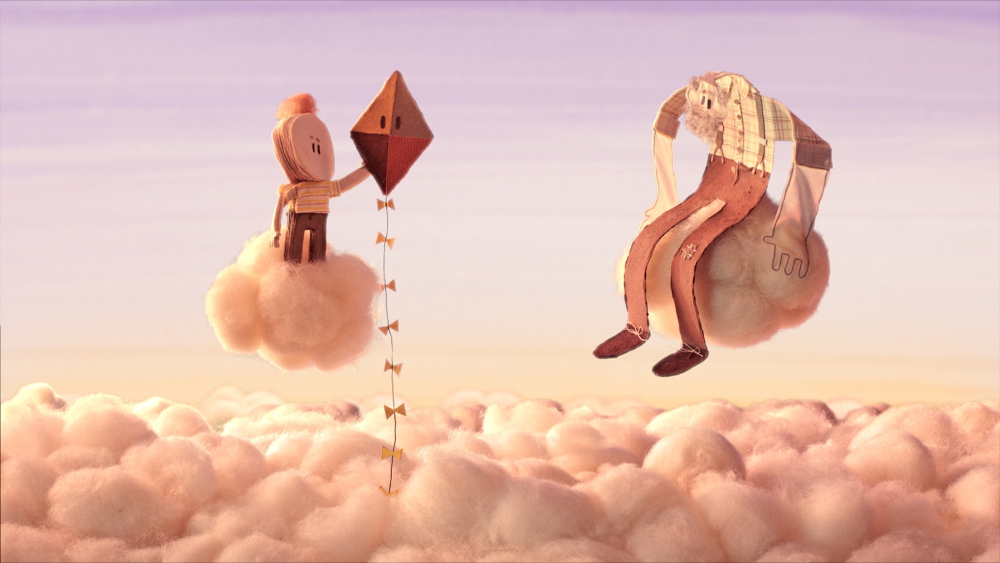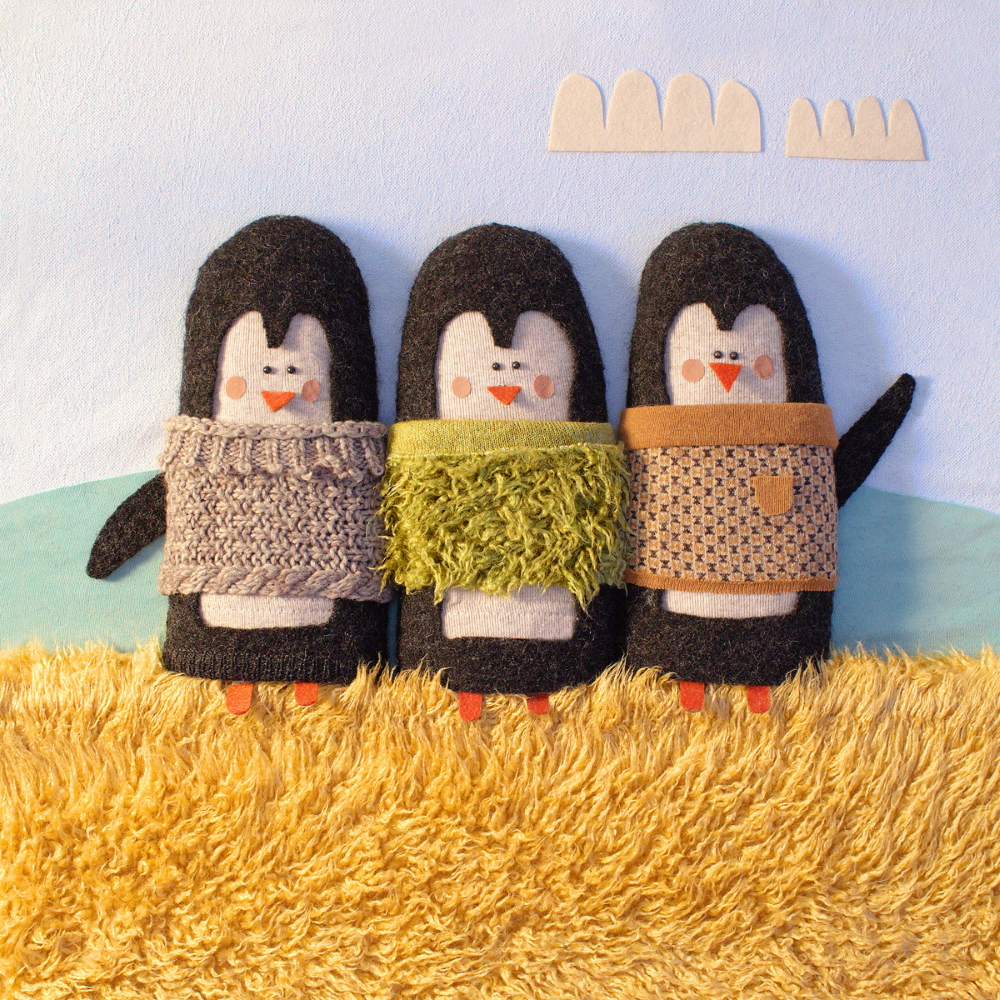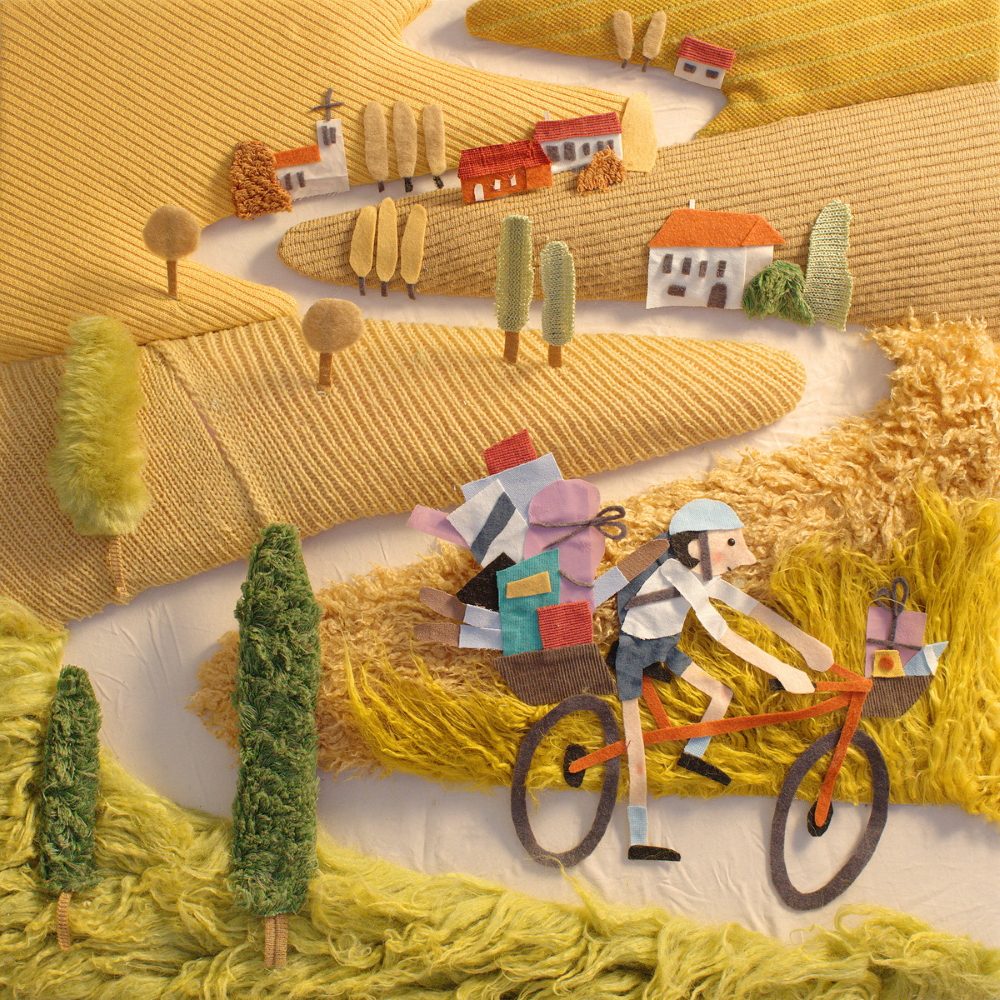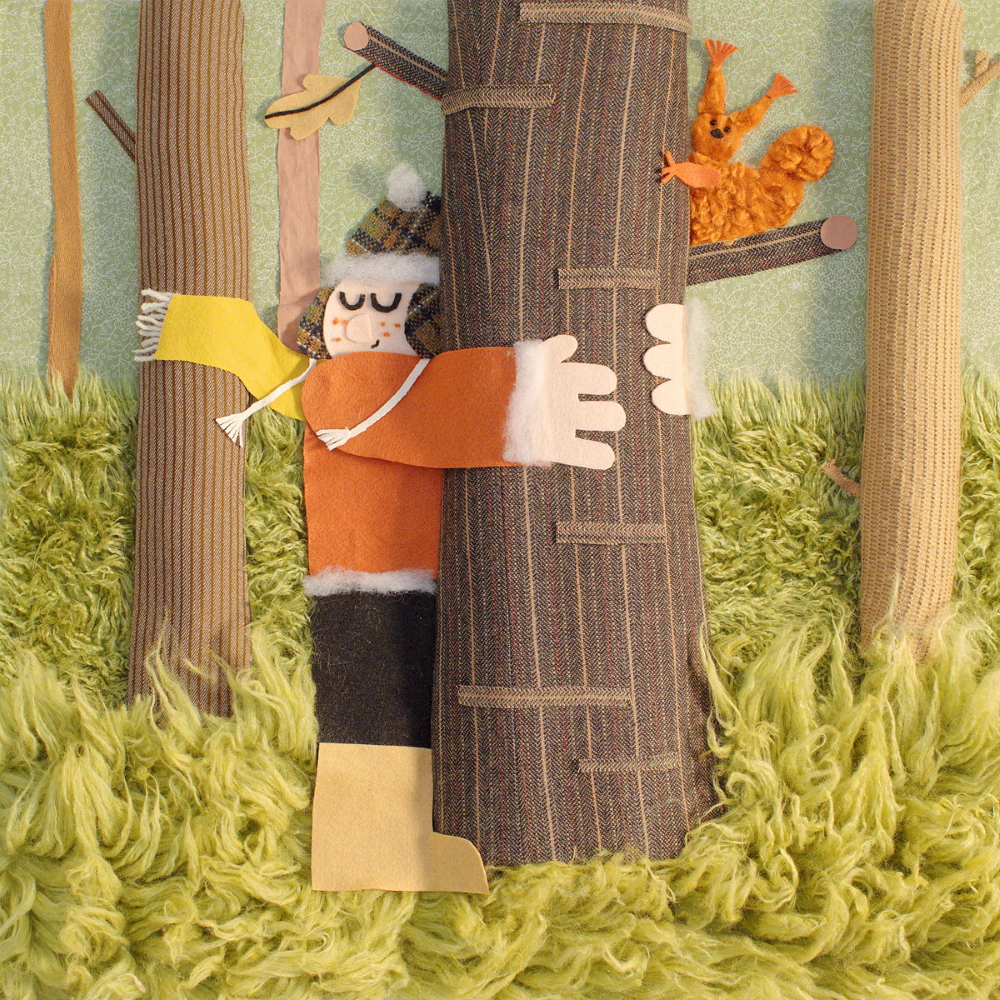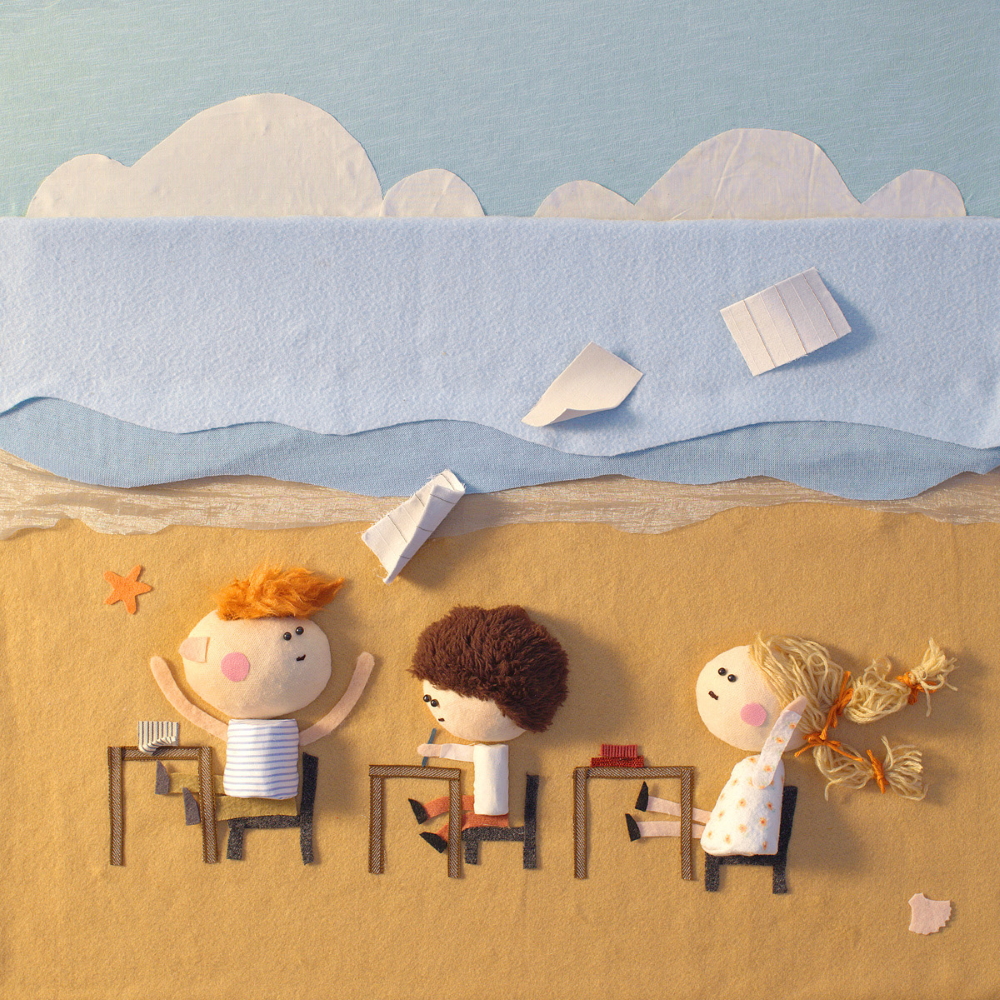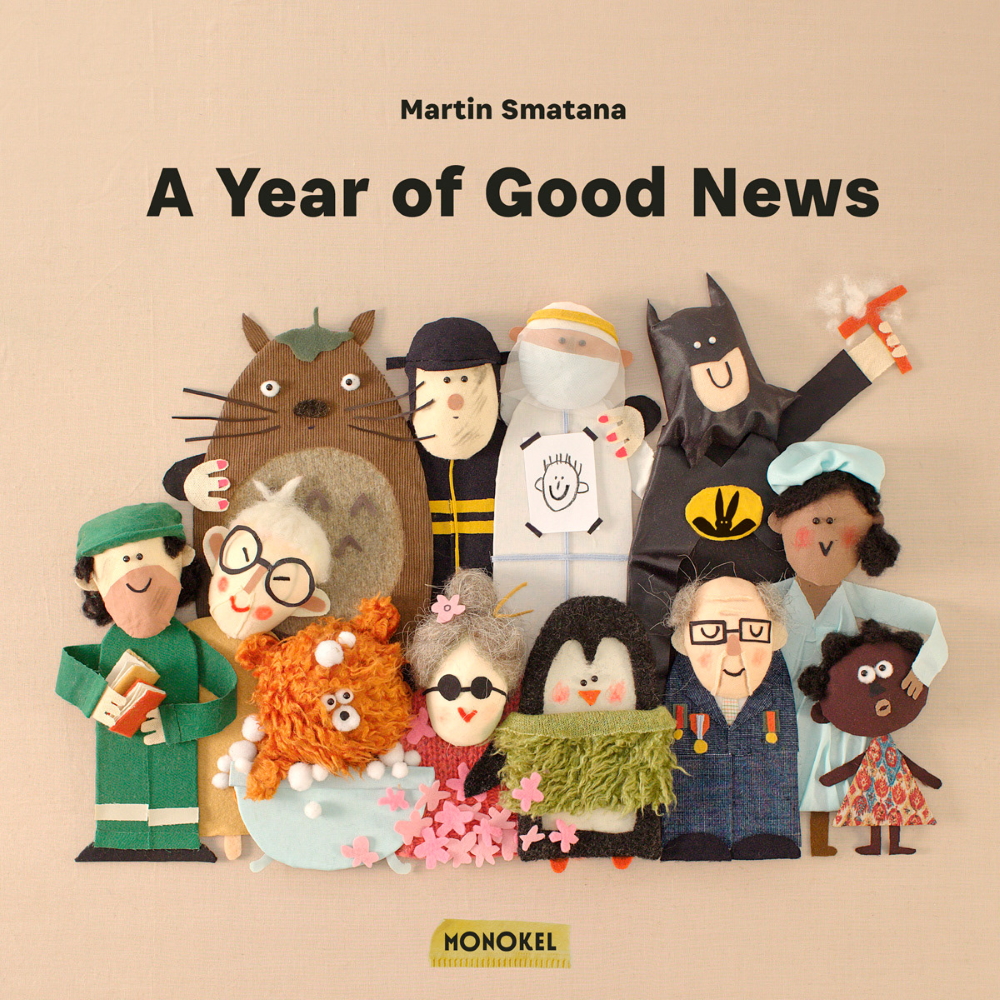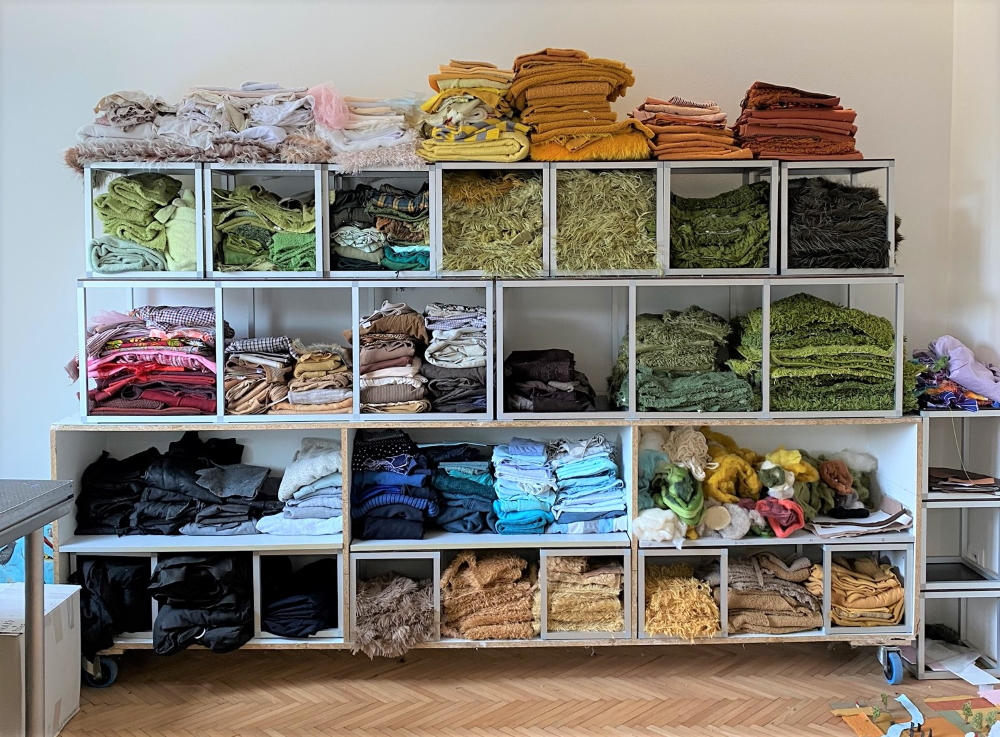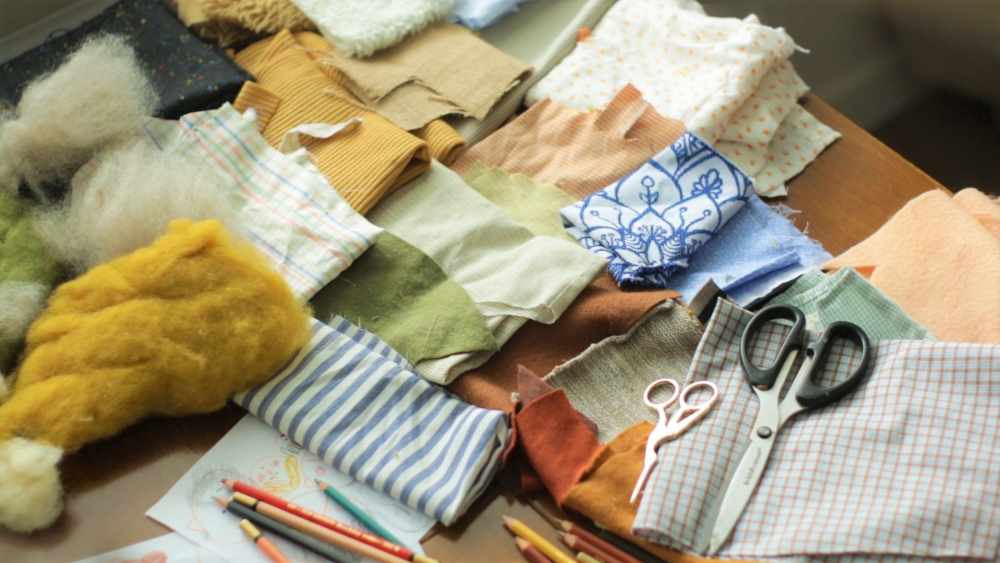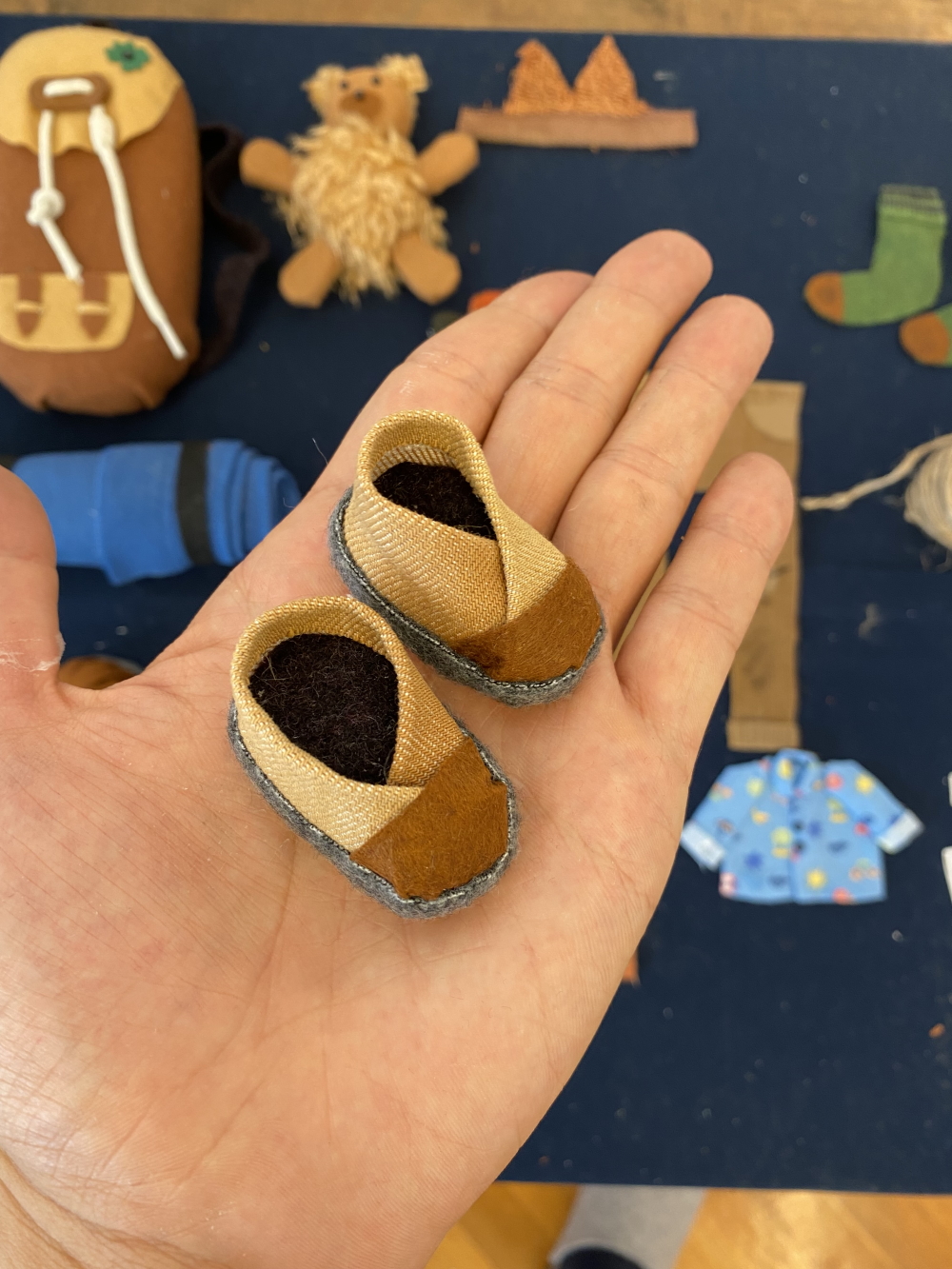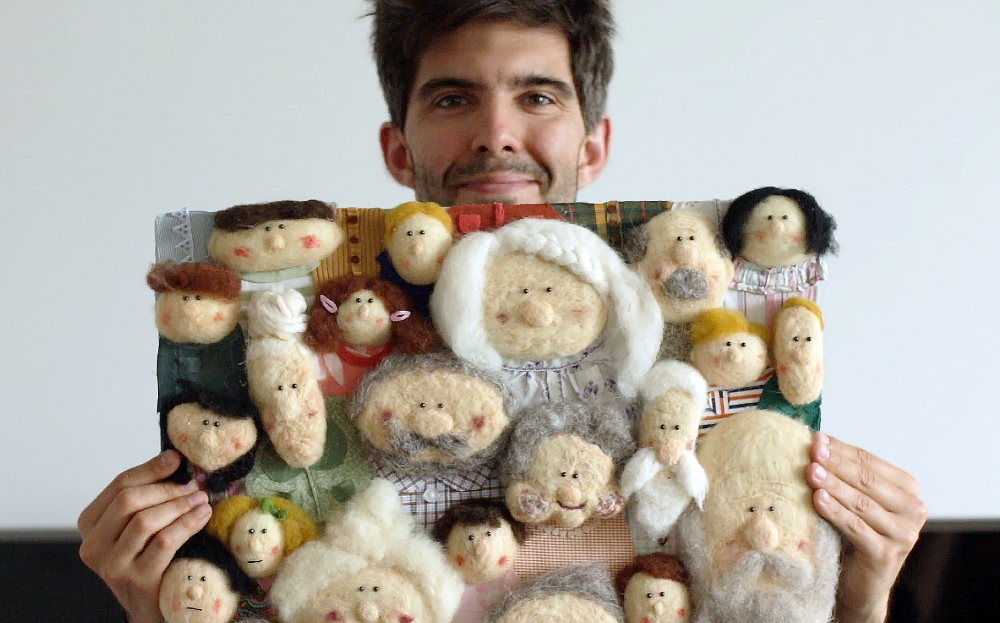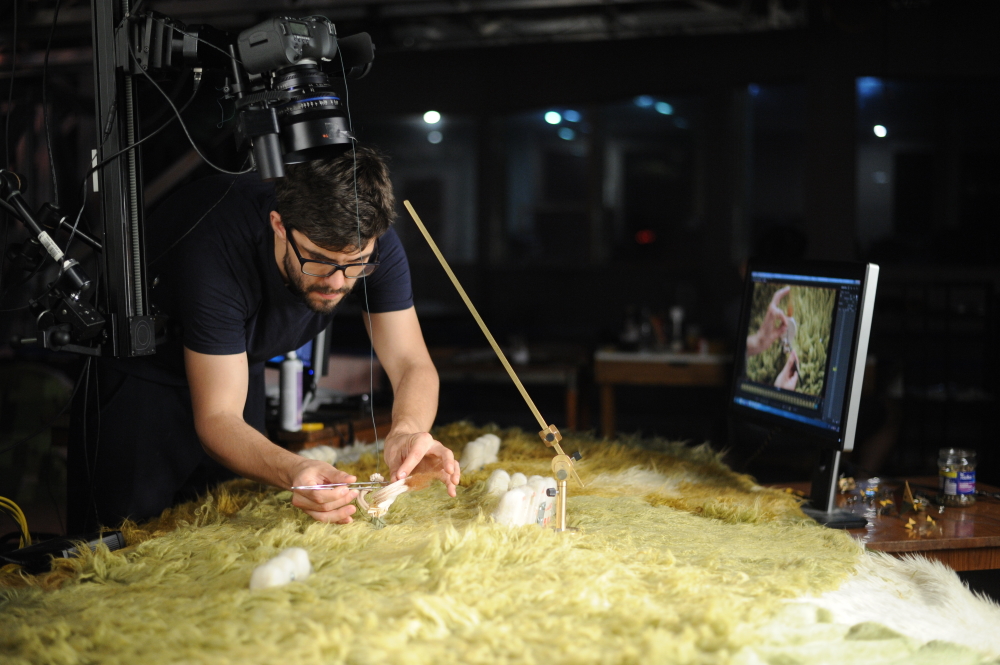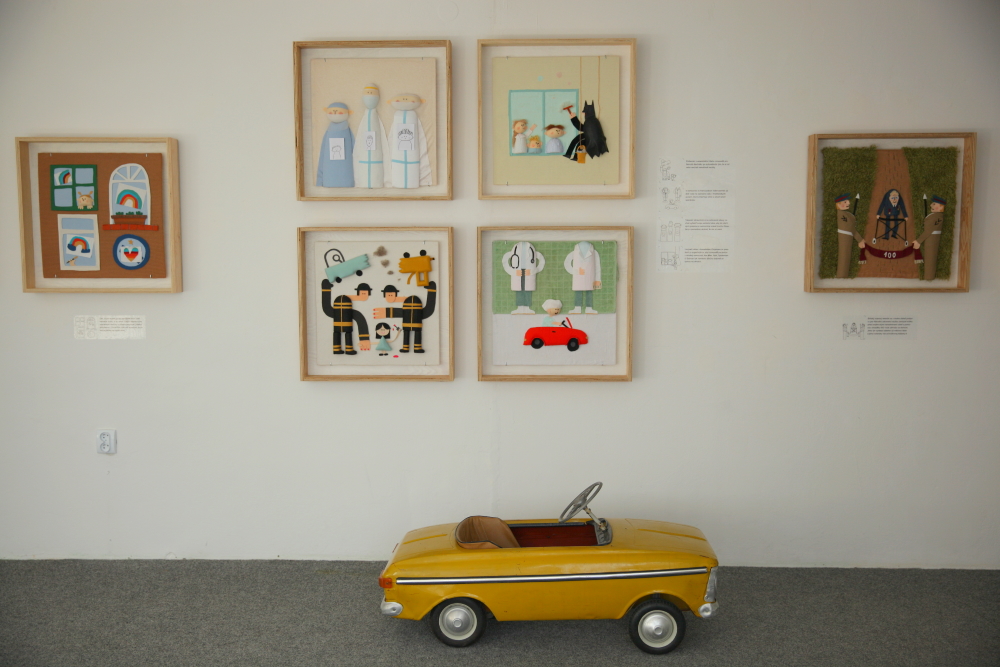Martin Smatana
freelance director of animated films / illustrator
Slovakia
„A Year of Good News“. An unique book that originated during the worldwide Corona-pandemic and proved that the impossible is possible: being motivated for doing something positive even when the circumstances are negative! For this project an awarded animation film director got to the basics of his daily job: from stop motion to still life. The aim: turning good news from around the world into a very particular illustration – one per week for an entire year! To realise that idea he and his team worked with soft, old fabrics like rugs and the textiles of used clothes in combination with cut-out hand drawings for telling the heart-warming stories. Such a charming handmade method resulted in 52 positive visuals to please people, lift their spirit and inspire them!
Martin Smatana
freelance director of animated films / illustrator
Slovakia
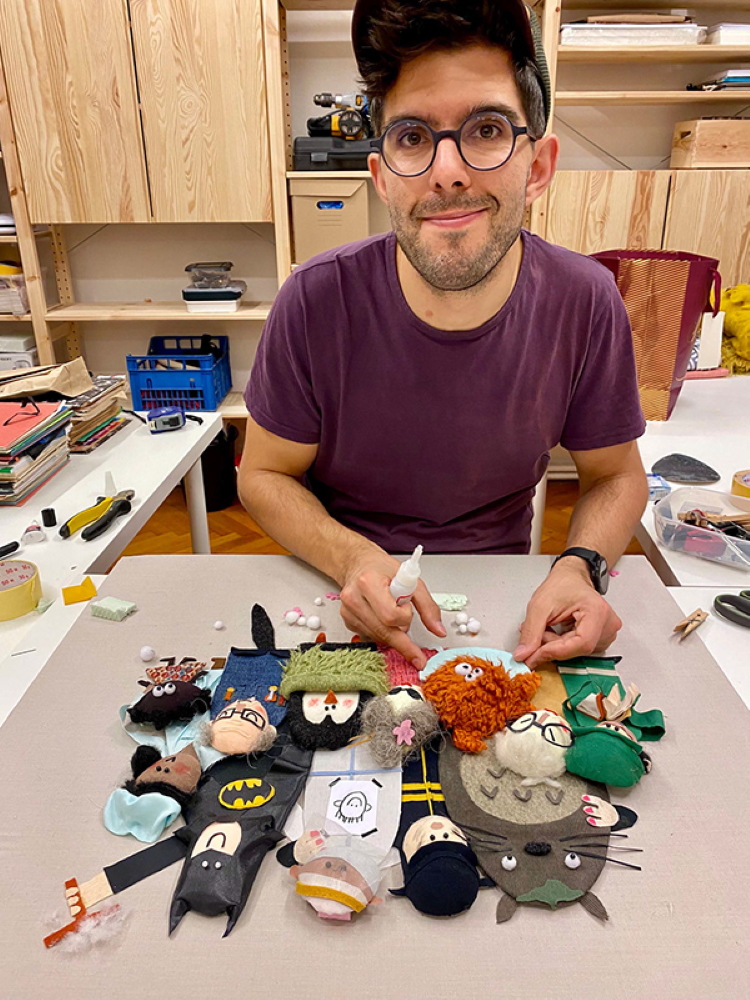
Three penguins in sweaters! A strange sight indeed, but the start of an outstanding creative idea. Martin Smatana read a touching story in the newspaper that was hidden under the big news of the day obviously: 109-years-old Australian Alfred Date knitted small sweaters for penguins that were affected by the oil spill on Phillip Island. The tiny dresses should prevent the waterbirds picking the oil that sticked on their feathers. In the end 97 per cent of the penguins in the hospital could be saved because of Down Under‘s oldest man‘s extraordinary idea. This news was the trigger for Martin Smatana to get started with transferring the real pictures into adorable arty ones.
The foundation for this man‘s profession was layed in his childhood already. Martin Smatana (* 1991) used to draw a lot when he was little. At the age of six little puppets made of plasticine caught his attention and their little movements were captured on film. Later on the twelve year old and his family went to see Finding Nemo in the cinema. The teenager was blown away by the American computer-animated comedy-drama adventure underwater bestseller that he wanted to become a director of animated films. Studying animation at The Academy of Performing Arts (VSMU) in Bratislava and taking a master in animation at Prague’s FAMU, the fifth oldest film school in Europe, secured a first class knowledge. Regarding his graduation movie Mister Smatana had something special in mind: a symbolic film for children about death! „When I was a little kid, I asked adults a lot of questions, especially where people go after they die“, he told zippyframes.com. „My grandpa told me that as old people get older, they also get thinner. At the end of their life, they are as thin as a sheet of paper, so one day the wind blows them and takes them up to the sky.“ This narrative was adapted and turned into a first draft of the story about a small boy, who gets a kite from this old grandfather. The idea was developed further and rewritten various times because the difficult topic should be told in an empathetic, imaginative way. Within two months and working 17 to 18 hours seven days a week the 13 minutes short animation film was shot and finished in November 2018. The enormous effort paid off quickly: „The Kite“ won over 60 international awards and is included in the Film Collection of the Museum of Modern Art in New York since June 2019! Furthermore: the side-effect of such a stellar success was a rising demand for his commercial work that chocolate confectionery brand Milka, French telecommunications corporate Orange and many more appreciate too.
The picture book mentioned at the beginning got rave reviews throughout. Besides that the author receives a lot of feedback from readers still. „Many have written to me that reading the book has encouraged them to do a little favor themselves, or even to call and talk to their loved ones“, goes his quote on hypeandhyper.com. „I think the book can help all of us realize that these past years haven’t been so bad after all.“ And another good news is: He‘ll keep on collecting positive stories from around the globe!
Martin Smatana and his wife Simona live and work in Trnava (Slovakia).
Interview December 2022
Magical poetry in visuals: the big effect of positive trifles
INTUITION/IMAGINATION
How does intuition present itself to you – in form of a suspicious impression, a spontaneous visualisation or whatever - maybe in dreams?
Intuition presents itself to me in a variety of ways. Sometimes it comes in the form of a suspicious impression or a gut feeling about a situation. Other times, it manifests as a spontaneous visualization or an idea that pops into my mind. Occasionally, I even get intuitive insights in my dreams. Overall, intuition is an important part of my creative process and I try to listen to it and follow its guidance when making decisions.
Will any ideas be written down immediately and archived?
Yes, I try to write down my ideas immediately and archive them for future reference. I find that this helps me to remember my creative insights and prevents me from forgetting important ideas. I use a variety of methods to capture my ideas, such as writing them down in a notebook or recording them in a voice memo on my phone. I also try to organize my ideas in a way that makes it easy for me to access and review them later. Overall, I believe that it is important to document and archive your ideas in order to keep track of them and use them in your work.
?: How do you come up with good or extraordinary ideas?
I come up with good and extraordinary ideas by staying curious and open to new experiences and ideas. Overall, I believe that staying curious and open-minded, and being willing to explore and experiment, are key to stimulating my imagination and coming up with good ideas.
Are great ideas based on intuition and do they reveal themselves in a kind of clear as well complete version that just has to be realized? Or is it endless trials and errors (after the first spark) that result in constant developments up until the final result?
Great ideas can be based on intuition and can sometimes reveal themselves in a clear and complete version that just needs to be realized. However, I also think that the process of developing an idea can often involve trials and errors and constant adjustments and improvements. In my experience, the process of turning an initial spark of an idea into a final result can involve a lot of experimentation and iteration. Sometimes, the final result is very different from the initial idea, and the process of creating it can involve a lot of trial and error. Overall, I think that the process of developing an idea can involve both intuition and iteration.
What if there is a deadline, but no intuition? Does the first fuel the latter maybe?
If there is a deadline but no intuition, I try to use the pressure of the deadline to fuel my creative process and help me come up with ideas. I find that the pressure of a deadline can sometimes help me to focus my mind and tap into my intuition. I also try to use the time constraints of the deadline to force myself to be more efficient and make quick decisions. If I am really stuck and cannot come up with any ideas, I may try to take a break and do something else for a while in order to clear my mind and relax. Overall, I believe that deadlines can be a helpful tool for stimulating creativity and helping me to come up with ideas.
INSPIRATION
What inspires you and how do you stimulate this special form of imaginativeness?
I am inspired by many different things, such as art, literature, nature, and everyday experiences. I find that exposing myself to a wide range of sources of inspiration can help me to stimulate my imagination and come up with creative ideas. I also try to engage in activities that help me to relax and clear my mind, such as meditation or exercise, which can help me to tap into my intuition and come up with creative ideas. Additionally, I try to collaborate with other creative people and bounce ideas off of them, which can lead to unexpected and exciting ideas.
How do you separate the good from the bad and which ideas are worthwhile to be explored further or whether one idea has the potential of being outstanding really?
I separate the good ideas from the bad ones by considering how well they align with my goals and interests, and by evaluating their potential for success. I try to be objective and realistic when assessing my ideas, and I consider factors such as feasibility, potential impact, and potential market demand. I also try to get feedback from others, such as colleagues or mentors, to help me assess the strengths and weaknesses of my ideas. Ultimately, I make a decision about which ideas are worth exploring further based on a combination of my own judgment and the feedback I receive from others.
When deciding which ideas to explore further, I consider both my own personal interests and the commercial potential of the idea.
Has it to appeal to you primarily or is its commercial potential an essential factor?
It is important for an idea to appeal to me personally in order to ensure that I will be motivated and passionate about working on it. At the same time, I also consider the commercial potential of the idea, as this can help to determine its potential for success. I try to strike a balance between pursuing ideas that are personally interesting and meaningful to me, and ideas that have the potential to be successful in the market. Ultimately, I believe that both factors are important in determining which ideas are worth pursuing.
Do you revisit old ideas or check what colleagues/competitors are up to at times?
Yes, I sometimes revisit old ideas and reevaluate them to see if they are still worth pursuing. I find that this can be a helpful way to refresh my creative process and come up with new perspectives on old ideas. I also occasionally check what colleagues or competitors are doing in order to stay informed about developments in my field and to get ideas for my own work. However, I try not to get too caught up in what others are doing, and instead focus on my own creative process and what inspires me personally. Overall, I believe that it is important to stay open to new ideas and perspectives, whether they come from my own past work or from the work of others.
CREATIVITY
Which time/place/environment suits your creative work process the best (tranquillity or pressure) and which path do you take from theory/idea to creation?
The best time, place, and environment for my creative work process depends on the specific project and my current state of mind. Sometimes, I find that I work best in a peaceful and quiet environment, where I can focus and concentrate without distractions. Other times, I may need a more stimulating and energizing environment, such as a bustling café or a busy park, in order to get my creative juices flowing. I also find that the right balance of pressure and relaxation can be helpful for my creative work. I try to create a comfortable and supportive environment that allows me to be creative and productive, but also gives me the freedom to experiment and take risks.
What is better in the realization process: speed and force creativity i.e. grasp the magic of the moment, or a slow, ripening process for implementation/elaboration?
Both, speed and slow, ripening processes can be useful in the realization process, depending on the specific project and the individual's creative process. Some people may work best with a fast, intuitive approach that allows them to capture the magic of the moment and quickly turn their ideas into reality. Others may prefer a slower, more deliberate process that allows them to carefully consider and refine their ideas before implementing them. I believe that the best approach will vary depending on the individual and the specific project, and that it is important to find a balance between speed and deliberation in the realization process.
If problems occur during creativity or one’s stuck even, how can these be solved?
First, I try to take a step back and relax, and take a break from the project if necessary. This can help me to clear my mind and gain a fresh perspective on the problem. I may also try to engage in activities that help me to relax and recharge, such as going for a walk or practicing meditation. Additionally, I may try to get feedback or advice from others, such as colleagues or mentors, who can provide a different perspective on the problem and help me to find a solution.
How important are self-doubt and criticism (by others) during such a process i.e. is it better to be creative on your own, only trust your own instincts, or in a team?
Self-doubt and criticism can be important during the creative process, as they can help to challenge and improve our ideas. At the same time, it is also important to trust our own instincts and not let self-doubt or criticism from others overwhelm us or prevent us from pursuing our ideas. I find that a balance between self-doubt and confidence, and between seeking feedback from others and trusting our own instincts, is key to the creative process.
As for working on your own or in a team, I believe that both can be effective approaches to the creative process. Working on your own can allow you to focus on your own ideas and follow your own creative vision. However, working in a team can also be beneficial, as it can provide support and collaboration, and can lead to new and unexpected ideas. I believe that the best approach will depend on the specific project and the individual's personal preferences and strengths.
Should a creative always remain true to him-/herself including taking risks & going against the flow or must one, for reasons of (commercial) survival, make concessions to the demands of the market, the wishes of clients and the audience’s expectations?
A creative person should always remain true to themselves, including taking risks and going against the flow. However, I also believe that it is important to consider the demands of the market, the wishes of clients, and the expectations of the audience when making creative decisions. Striking a balance between staying true to oneself and making concessions to the demands of the market can be challenging, but it is an important part of the creative process. I believe that it is possible to maintain your creative integrity while also being responsive to the needs and expectations of your clients and audience. Ultimately, I think that it is important to find a balance between staying true to yourself and being flexible and adaptable in response to the demands of the market.
How is innovation still possible if one has established a distinctive style and, just in case, is it good to be ahead of one’s time even one hazards not being understood?
It is possible to maintain a distinctive style and still be innovative. In fact, having a distinctive style can provide a framework for experimentation and innovation. I find that I am able to explore new ideas and techniques within the context of my established style, and that this allows me to push the boundaries of my work without losing my distinctive voice.
As for being ahead of one's time, I believe that it can be both a blessing and a curse. Being ahead of your time can allow you to explore new ideas and concepts that may not be understood or appreciated at the time, but that may be recognized and celebrated in the future. However, being ahead of your time can also be difficult, as it may mean that your work is not understood or appreciated by your contemporaries. Ultimately, I think that the decision to be ahead of your time is a personal one, and that it depends on the individual's goals and priorities.
When does the time come to end the creative process, to be content and set the final result free - or is it work-in-progress with an endless possibility of improvement?
Deciding when to end the creative process and set the final result free can be a difficult decision. In my experience, it is important to be content with the final result and to feel that it represents the best possible version of the idea. At the same time, it is also important to recognize that there is always the possibility of improvement, and that there may be things that can be changed or improved in the future. I believe that the right balance between being content with the final result and leaving room for improvement is a personal decision, and will vary depending on the individual and the project. Ultimately, I believe that it is important to be satisfied with the final result and to feel that it represents the best possible version of the idea.
In case of failure or - worse - a creativity crisis how do you get out of such a hole?
Taking a break, getting support from others, and staying open to new ideas can be helpful for getting out of a creative hole.
SUCCESS
Should/can one resist the temptation to recycle a ‘formula’ one’s successful with?
I believe that this can lead to stagnation and lack of growth. I think that it is important to constantly challenge oneself and push the boundaries of one's work in order to stay fresh and creative. I find that taking risks and trying new things, even if they may not be successful, can be a valuable part of the creative process.
Is it desirable to create the ultimate/timeless work, but doesn’t “top of the ladder” bring up the question of “what’s next?” i.e. isn’t such a personal peak “the end”?
It is desirable to create the ultimate or timeless work, but achieving this goal may raise the question of "what's next?" Reaching the top of the ladder and creating the ultimate work may be a personal peak, but it does not necessarily mean that it is the end. I believe that it is important to continue to challenge oneself and strive for growth and improvement, even after achieving great success. I find that setting new goals and continuing to push the boundaries of my work keeps me motivated and engaged in the creative process.
MY FAVORITE WORK:
My favourite artwork that I have created is still my short film The Kite.
